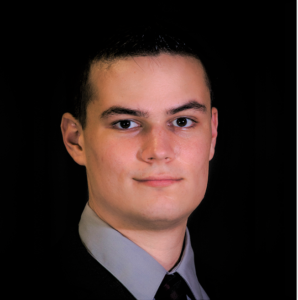Innovating AI to combat health disparities in breast cancer treatment
- July 25, 2023
- By: Alexander Keller
- Our People
Related Links
 Breast cancer is the second-most common form of the disease in women in the United States. However, it does not affect everyone equally. While Black women make up a smaller proportion of breast cancer cases compared to white women, they are at a significantly higher risk of death than their white counterparts. Part of the problem, an American Cancer Society study suggests, is that some minority communities may not have access to the same screening resources that others do.
Breast cancer is the second-most common form of the disease in women in the United States. However, it does not affect everyone equally. While Black women make up a smaller proportion of breast cancer cases compared to white women, they are at a significantly higher risk of death than their white counterparts. Part of the problem, an American Cancer Society study suggests, is that some minority communities may not have access to the same screening resources that others do.
That’s where Chase Waggener’s work comes in.
Waggener, a member of the Shawnee Tribe, is the artificial intelligence development lead with MedCognetics, a Dallas-based health care company that develops artificial intelligence and machine learning platforms for use in radiology. He hopes that by designing AI to detect breast cancer in underrepresented populations, his research can help level the playing field.
“An outcome that I find really important is the ability to deploy these algorithms in underserved areas or overseas places where you don’t have access to, let’s say, a breast imaging specialist,” he said.
Though Waggener originally planned to go into medicine, he found he was more interested in studying the application of AI/ML in health care. Now, he works with a University of Texas at Dallas professor, Dr. Lakshman Tamil, who is a member of the MedCognetics’ board of directors and a hub-specific pilot program awardee through the Artificial Intelligence/Machine Learning Consortium to Advance Health Equity and Researcher Diversity, or AIM-AHEAD.
AIM-AHEAD is a National Institutes of Health-funded national consortium created in partnership with The University of North Texas Health Science Center at Fort Worth. Its coordinating center consists of several cores at various institutions across the nation, and the leadership core is housed at HSC — under the direction of Dr. Jamboor K. Vishwanatha, vice president of HSC’s Institute for Health Disparities.
AIM-AHEAD is providing resources
Equipped with resources and funding through AIM-AHEAD, Waggener and Tamil are working on a project to develop algorithms designed to better detect breast cancer in minority populations.
AI is far from perfect. Algorithms drawing from biased data can produce biased results, which makes having a large, diverse set of training data incredibly important.
MedCognetics, Waggener explained, “sourced data from India, Europe and North and South America, trying to cover a very geographically diverse area. That, in turn, helps cover a very racially diverse pool of data.”
However, in a very large data set, smaller minority populations may be overlooked by AI. As a member of the small Shawnee Tribe, Waggener considers this carefully.
“Last I checked, I think [the data set] was, like, 3,000 members,” he said. “On the scale of data that we’re working with, the data pool is so big that your algorithm might not have any incentive to concern itself with its performance on that subgroup, unless you help or encourage it to do so.”
One strategy for dealing with that problem is to oversample smaller groups.
“Let’s say you have a data set that is 80% white and 20% Hispanic,” Waggener said. “You can more frequently use training examples from the Hispanic group, effectively showing the model an equal number of white and Hispanic samples.”
This useful method can scale to as many subgroups as needed, but Waggener points out that AI is prone to generalizations and taking shortcuts. One instance he recalled involved a program being trained to recognize wolves.
“The algorithm did pretty well on some type of wolf, but what they found is that the algorithm didn’t even look at the wolf. It looked at the snow in the background,” he said.
In health care, the stakes are higher, Waggener warned.
“When you have supervised learning, it’s very easy for the algorithm to learn these things that you don’t want it to, including racial bias.”
That’s where data quality becomes particularly important. Using well-labeled images, a process called “overfitting,” can help reduce the risk of the AI learning something that is not actually meaningful.
Sometimes getting that label-rich data simply isn’t an option. Waggener explained that this means, for now, at least, they’re not quite at a place where breast cancer detection is totally automated. Even so, he’s optimistic.
“AI is accelerating, and the more data availability that we have, and as computer power continues to grow, I think we could get there eventually,” he said.
That challenge is part of what inspired Waggener to pursue the Ph.D. program at UT Dallas. He wants to build a large, unbiased foundation model that other health care-focused AI/ML projects can draw from.
“The idea of building this foundational model is to give people a starting point to allow them to do their research or work faster,” Waggener said.
The future of AI breast cancer treatment
His model will eventually utilize new technologies like transformers — the backbone of products like ChatGPT — to allow it to train with unlabeled or weakly labeled data. This would provide a much wider array of sources to pull from, helping ensure the model is as comprehensive and unbiased as possible.
Waggener’s project is already delivering real-world results. Not only has MedCognetics deployed platforms in Nigeria and other foreign countries, but a full-field digital mammography product was cleared by the U.S. Food and Drug Administration earlier this year, and the company is currently working on a 3D mammography product. MedCognetics is also preparing to deploy its platform at a few different sites across the U.S.
Waggener expressed gratitude to the Shawnee Tribe for their support during his academic and professional journey.
“With all this research, I hope that it comes back around and ends up being worthy of all that support they provided me over many years now.”
The AIM-AHEAD coordinating center is supported by NIH under OT2OD032581 to Univ of North Texas Health Science Center.





Social media